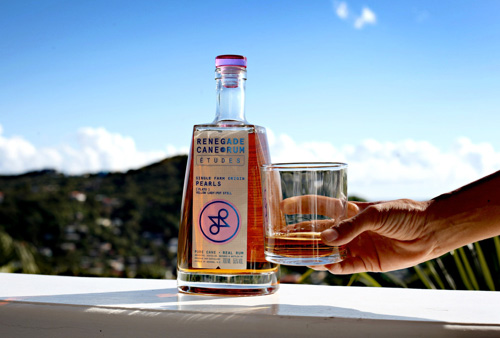
RUM'S TIME IS NOW
Rum has been on the brink of becoming the next big thing in the drinks industry for the last ten years, finally it looks ready to cross the line and join whisky in the luxury market.
Cask Trade have been given exclusive rights to sell Renegade Rum casks for the next three years. It's the latest creation by Mark Reynier - the mind behind the success of Bruichladdich on Islay and Waterford Distillery in Ireland, so there's plenty to be excited about.
Premium rum sales rose 85% in the last quarter and account for 33% of the premium spirit market.
This has been achieved through the positioning of rum as not just a fun alternative to whisky, but an honest representation of the people and culture of the country where the rum is made.
A positive step has been smaller producers working together to establish Geographical Indications to protect the provenance of their rums. The wider impact of this is that it gives people the agency to talk about rum in a familiar way to wine and whisky, building a tangible world of rum to explore.
It has also come from producers such as Grenada’s Renegade Rum pushing for greater regulation and quality assurance in production, reminiscent of the – grain to glass – ethos in Scotch whisky. In short, the focus on quality raw material and sustainable production.
Firstly, the raw product. Influenced by the terroir (the soil and geography of where the product is made), high quality rum uses fresh sugar cane juice rather than molasses. The water source is also important, as these two ingredients will get mixed with yeast to begin the process of making alcohol – fermentation.
Next is the equipment used to distil the ferment, also called wash. Copper stills from a reputable producer are essential. Renegade use stills from Forsyths of Rothes – they have supplied Scotch whisky distilleries for generations.
Aged rum goes through a similar maturation process to whisky, however there are nuances that mean it could be a better opportunity for those looking for a shorter return period.
The optimal maturation time for a rum cask in Grenada is three to five years, this provides a good alternative to whisky – which is increasingly a ten year plus investment. This is due to the warmer climate, which accelerates the process of ageing through increased evaporation per year and faster chemical reactions.
The same rules still apply to the wood and good quality is a must for the best results, so sourcing the ideal casks is crucial. Renegade uses several different types of casks including American and French barrels.
Oak can take over 100 years to grow before it is ready to be made into casks, meaning despite the quicker maturation times, aged rum is still a product steeped in history and time.
Renegade only produced 270,000 litres last year, with American and French markets already showing a large interest in the liquid, which means this limited first supply could go quickly and increase in value.
A danger of whisky has been the overhype of smaller brands that do not have the equity and proven success of the bigger luxury names. With a proven track record of building successful brands, such as Bruichladdich and Waterford Distilleries, Mark Reynier means Renegade Rum is in good hands.
Renegade also has the distinction of having Grenada's first all female distilling team. The distillery did not set out to make this the case, however the best candidates were all woman and got the roles on merit.
The rum world is opening and is more innovative than ever. By setting up a strong foundation based on sustainability, it will continue to steal the space from gin and vodka on the duty free shelves.
Interested to buy a barrel of rum or in whisky investment? For more news from the Masters, sign up to our newsletter by ticking the box at the bottom of the registration form. Follow us on Instagram, TikTok, Facebook, Twitter, LinkedIn and YouTube.